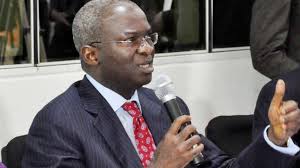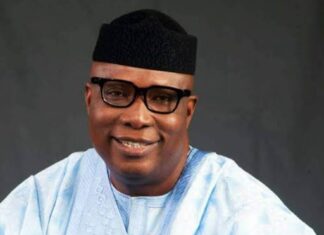Minister of Power, Housing and Works Babatunde Fashola has denied any suggestion that contracts and concessions granted in the power sector under the privatisation programme will be cancelled to pave way for new ones.
Fashola, who spoke at the weekend during the Nigerian pension industry strategy implementation roadmap retreat, said that cancelling the concessions, particularly those to local investors, would send the wrong signal to the international community about the country’s ability to honour contracts.
He said, “The question I ask is this: if we needlessly cancel concessions granted to our own people, what incentive and assurance do we give to outsiders to invest if the investment of our own people is not secure in their land. If you consistently horse-whip your own children in your home, why should I let my own children visit your home?”
According to him, no responsible government hastily cancels contracts involving local and international entities without considering the long-term effects of such an action.
Fashola explained that rather than outright cancelations, the government would call for renegotiations of the contracts and concessions where the need arises.
The minister decried the practice where newly formed governments begin a review of all contracts signed by their predecessors, cancel or frustrate them even when they are performing, saying that what they do inadvertently is to create a climate that diminishes the sanctity of contracts, and negatively affects the ease of doing business.
“It is a practice that is particularly prevalent on the African continent and, I argue, that in some part contributes to our continent’s deficiency of infrastructure. I am not saying that government must not terminate non-performing contracts. Indeed these are rights that are standardly provided in all well drawn contracts. What I am saying is that contracts cannot be terminated or frustrated on trumped up reasons simply because a new government does not like the affiliation of the holder of the contract.
“It weakens the economy, it frustrates enterprise and leads to poverty and unemployment through job losses, loans taken from banks are endangered and the knock-on effect is more than we often can see on the horizon, because the bad word spreads around the global investment community very quickly like wildfire.
“Yes, it may be the case, sometimes, that the past government did not act in good faith, or even compromised or was even negligent. The answer is not cancellation, if the contract is performing; the answer is renegotiation.
“You can invite the holder of the contract, confront him with evidence of compromise, bad faith or recklessness, and this is easy to get if there is diligence, and you propose new terms,” the minister stated.
Fashola, whose keynote address was entitled, “Overcoming the Challenges and Managing the Risks and Constraints that Inhibit the Investment of Private Capital and Funds in Nigeria’s Infrastructure Landscape in Order to Make a Visible Economic Impact,” said the time has come for Nigeria to look into how it can harness the money in its contributory pension funds given the falling oil prices and dwindling revenue.
He said it was regrettable that given the growing size of the funds from the contribution, much of the money had largely been invested in government purse when there are places where it could be more impactful.
Fashola noted that with the right attitude to diversification, utilising the huge fund contributed by Nigeria’s working class showed that the national economy is bigger than the challenges posed by the dwindling oil prices.
He noted that while African countries are literally sitting on a pot of money with 10 top pension funds in sub-Saharan Africa totalling $310 billion, most countries on the continent have been scurrying after loans from multilateral agencies, including the Chinese government which is offering $20 billion loans to the whole of Africa.
“It is estimated that Sub-Saharan Africa’s 10 largest pension fund markets had approximately $310 billion in assets recently. But while these funds are not serving the real sector of roads, bridges, hospitals, rails, airports, fee-paying universities, there is palpably visible poverty in most of these countries, some of which gather to seek funding support in South Africa recently at the instance of the Chinese Government which offered funding support (loans) of $20 billion for all of Africa, when 10 pension funds had $310 billion to invest.
Many of these countries, he noted, were scurrying after multilateral agencies looking either for aid or loans, while sitting literally on a pot of money.
He said: “If Africa is poor today, it is not because of lack of resources; rather it is likely a poverty of ideas or the abundance of risk-elevating attitudes, some of which I have alluded to, such as judicial and political, and these must change.”
He said the attitudes that once mired pension funds management in scandals and lack of transparency had led to very stringent legislative interventions that limited the scope of activities that pension funds could participate in.
“For example, until recently, the Nigerian Pension Fund Law limited the contributor from using part of his pension to secure a mortgage. How, one may ask, is a person supposed to finance or part-finance ownership of a home if he cannot use his own savings?”
Making recommendations, Fashola said investment outlets that the pension funds can be invested include roads that can be tolled, like housing, the 4th Mainland Bridge, the Coastal Road linking several coastal states from Lagos to Bayelsa; the new seaport in Lekki and Badagry, the refinery by Dangote, Ajaokuta Steel, a petrochemical plant in the Niger Delta; the broke textile mills in the North and South of Nigeria that require new equipment and disciplined fiscal, technical and organizational management; prison in each of the six geopolitical zones of Nigeria that can help strengthen our justice system and decongest the colonial prisons we have kept as relics of our own sense of justice; they are in hostels for students in Nigerian universities, embedded power plants in the universities, most of which have teaching hospitals and provide an opportunity to power education and healthcare. The list is endless.”
According to Fashola, the time for it is now.
“This is the biggest opportunity to act towards diversification rather than sloganize about it. This is the time to show that our nation and our national economy is bigger than the challenges posed by the dwindling oil prices. This is the time to diversify and change the face of our economy once and for all. But the risks that stand in the way are caused by us and they must be changed by us.”
The minister also advocated the predominant use of arbitration if the private capital funded concessions and PPPs would succeed in the country, saying a situation where a case that has to do with public private contract or investment would last for years was anti-investment.
He cited the case of the Lagos-Ibadan Expressway where work has stopped as a result of court cases involving the Federal government and contractors, pointing out that the easiest and more acceptable way to resolve disputes arising from investment transactions was arbitration.
The minister also advised judges deciding commercial disputes to act in a commercial and expeditious manner and refrain from granting injunctive orders that will stop the business, adding that a worrisome number of power projects are caught up in protracted court cases while the nation waits for electricity to drive the economy.
-Leadership













